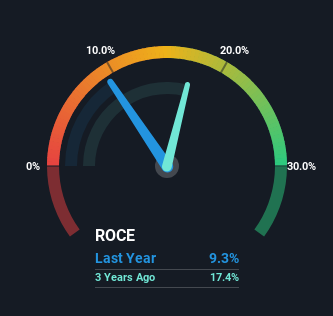- India
- /
- Electronic Equipment and Components
- /
- NSEI:SYRMA
There Are Reasons To Feel Uneasy About Syrma SGS Technology's (NSE:SYRMA) Returns On Capital
There are a few key trends to look for if we want to identify the next multi-bagger. One common approach is to try and find a company with returns on capital employed (ROCE) that are increasing, in conjunction with a growing amount of capital employed. If you see this, it typically means it's a company with a great business model and plenty of profitable reinvestment opportunities. Although, when we looked at Syrma SGS Technology (NSE:SYRMA), it didn't seem to tick all of these boxes.
What Is Return On Capital Employed (ROCE)?
For those who don't know, ROCE is a measure of a company's yearly pre-tax profit (its return), relative to the capital employed in the business. Analysts use this formula to calculate it for Syrma SGS Technology:
Return on Capital Employed = Earnings Before Interest and Tax (EBIT) ÷ (Total Assets - Current Liabilities)
0.093 = ₹1.6b ÷ (₹25b - ₹8.6b) (Based on the trailing twelve months to June 2023).
Therefore, Syrma SGS Technology has an ROCE of 9.3%. In absolute terms, that's a low return and it also under-performs the Electronic industry average of 13%.
Check out our latest analysis for Syrma SGS Technology

Above you can see how the current ROCE for Syrma SGS Technology compares to its prior returns on capital, but there's only so much you can tell from the past. If you'd like to see what analysts are forecasting going forward, you should check out our free report for Syrma SGS Technology.
What Does the ROCE Trend For Syrma SGS Technology Tell Us?
On the surface, the trend of ROCE at Syrma SGS Technology doesn't inspire confidence. Over the last four years, returns on capital have decreased to 9.3% from 29% four years ago. However, given capital employed and revenue have both increased it appears that the business is currently pursuing growth, at the consequence of short term returns. And if the increased capital generates additional returns, the business, and thus shareholders, will benefit in the long run.
On a related note, Syrma SGS Technology has decreased its current liabilities to 34% of total assets. That could partly explain why the ROCE has dropped. Effectively this means their suppliers or short-term creditors are funding less of the business, which reduces some elements of risk. Some would claim this reduces the business' efficiency at generating ROCE since it is now funding more of the operations with its own money.
In Conclusion...
Even though returns on capital have fallen in the short term, we find it promising that revenue and capital employed have both increased for Syrma SGS Technology. And the stock has done incredibly well with a 117% return over the last year, so long term investors are no doubt ecstatic with that result. So while investors seem to be recognizing these promising trends, we would look further into this stock to make sure the other metrics justify the positive view.
Syrma SGS Technology could be trading at an attractive price in other respects, so you might find our free intrinsic value estimation on our platform quite valuable.
While Syrma SGS Technology may not currently earn the highest returns, we've compiled a list of companies that currently earn more than 25% return on equity. Check out this free list here.
New: Manage All Your Stock Portfolios in One Place
We've created the ultimate portfolio companion for stock investors, and it's free.
• Connect an unlimited number of Portfolios and see your total in one currency
• Be alerted to new Warning Signs or Risks via email or mobile
• Track the Fair Value of your stocks
Have feedback on this article? Concerned about the content? Get in touch with us directly. Alternatively, email editorial-team (at) simplywallst.com.
This article by Simply Wall St is general in nature. We provide commentary based on historical data and analyst forecasts only using an unbiased methodology and our articles are not intended to be financial advice. It does not constitute a recommendation to buy or sell any stock, and does not take account of your objectives, or your financial situation. We aim to bring you long-term focused analysis driven by fundamental data. Note that our analysis may not factor in the latest price-sensitive company announcements or qualitative material. Simply Wall St has no position in any stocks mentioned.
About NSEI:SYRMA
Syrma SGS Technology
Provides turnkey electronic manufacturing services in India, the United States, Germany, and internationally.
High growth potential with excellent balance sheet.
Similar Companies
Market Insights
Community Narratives



